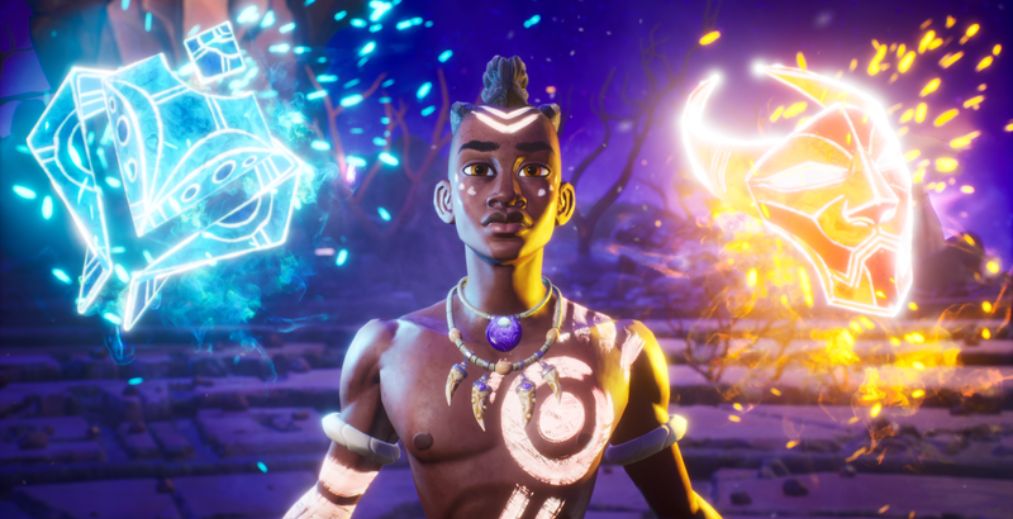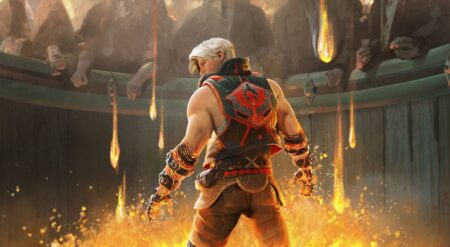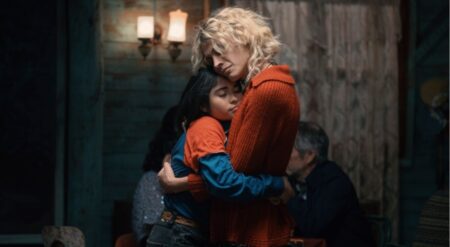Our interview with Abubakar Salim was conducted on-site at SXSW and edited for length and clarity. If you’d like to listen to the full interview about Tales of Kenzera: Zau, hit play on the audio player below.
After his panel at SXSW, I spoke to the actor-turned-studio head Abubakar Salim. Surgent Studios’ debut game, Tales of Kenzera: ZAU, which is published under the EA Originals banner, is a story about grief. But unlike other forms of media tackling the subject, Tales of Kenzera: ZAU is a vibrant blend of Bantu mythology, each level taking the player through different emotions and quests to process their loss. We spoke with Abubakar Salim about creating Tales of Kenzera: ZAU, the importance of teaching young men that they can cry and feel pain, too, and ultimately, how grief can’t be explained as just one emotion.
We sat next to each other and began talking about Tales of Kenzera: ZAU, but more importantly, our experiences with grief. I’ve lost nine family members since 2020. And those losses each feel heavier, but gaming helps. I asked Salim about the role he wants his game to play in others’ grieving processes, to which he responded that he wants the game to make players feel like they aren’t alone.
He explained, “I remember when I was grieving, I felt very isolated and very alone. That’s what grief is. Grief is very personal [and] it’s always different. No matter who you are or where you are, there’s no book about it that can really tell you about the journey… When I was grieving, the first thing I did was play games. It was a way of jumping into a world and escaping—to a degree.” He continued, “I want to tell a story that connects and resonates with those who are grieving. [I want it to hit] quite close to home.”
Abubakar Salim and Surgent Studios are giving its players permission to not be okay. The permission to let their resiliency slip and feel how they need to. Often, masculinity means being immovable during the hard times, pushing your grief to the side to be the rock for others.

But boys and men deserve to feel the weight of their sadness and process their own grief, too. This is true for all men but particularly salient for men of color. I asked Salim how he viewed Tales of Kenzera: ZAU as a vehicle to teach boys and men, and he responded, “I remember, when I was grieving, the first thing that I remember my mom telling me is, ‘You’re the man of the house now. You’re the man of the family.’ It was almost like this element of, ‘man up,’ just continue on [and] don’t feel sad. Just move forward. [I remember] not really having that moment to actually feel sad, to grieve, to miss someone, you know?”
He continued, “I think it’s quite common with all men really. It’s one of those [things] where men are very good at closing themselves off or not necessarily emoting [and] just dealing with it—being rational about things rather than necessarily looking at themselves and feeling vulnerable or feeling emotional. It took me a while to realize. Even though making this game has also opened and unlocked a lot for me emotionally, where I’ve realized that, actually, it’s all part of healing. Just talking about it and being open about it, especially within, as you mentioned, Latino and African communities, [grieving] is not a male thing.”
It’s been clear since Tales of Kenzera: ZAU was announced at 2023’s The Game Awards that Salim’s own relationship with loss is the center of the game. And that grief is central even to the game’s genre as a Metroidvania. For Salim, Metroidvanias capture precisely what it means to grieve, to not be sure where to go, to not be sure what to do next. But to ultimately figure it out.
He explained, “It’s very much like the throwing a character in, and they have no idea about, and they’re having to try and learn about it as they go along. And that’s basically what grieving is, right? You can never expect when it’s going to happen, why it’s going to happen. Because even when you’re prepared for it, it never even knew you’re never really. That made sense to me as to why [Metroidvanias] fit grief perfectly.”
Salim adds, “The other element of it [is that] grief isn’t always sad. It’s everything. There’s anger, there’s relief, there’s sadness, there’s happiness; it’s weird. It’s like this kind of influx of emotion. It’s almost chaotic in a way. And that’s essentially why I want to make this fast-paced, vivid experience. That’s the journey. It’s always going to be messy, but you can find some form of logic, even in the mess. That was why I really wanted to lean into the madness of it all. But at the same time, enjoy the play of it all. [Enjoy] the freedom of it all gives you the agency to kind of chart your own journey.”

Conveying the complexity of an emotion that many flatten into sadness isn’t necessarily an easy task. While the Metroidvania genre lends itself to this, there is more involved with bringing that vivid exploration of humanity to life. For that, Salim uses Bantu mythology and culture.
“Something that I really wanted to pull from was all the rich Bantu culture,” he explained, “The tribes, either the Maasai, or the Zulu, or Ndebele, all these really cool tribes. I wanted to celebrate the art that they bring in, as well as the world and stories that they bring. I wanted to create a world and a space that celebrates these cool cultures. Everything was influenced not only by these tribes but also, as I say, the emotions or the journey of grief and mixing that.”
But it’s not just the colors, folklore, and designs; it also brings cultural moments to life to show the grieving process. Abubakar Salim continues, “For example, The Highlands, which is the first level that you go through, is all about anxiety. [The biome] is all about dealing with that [emotion]. Not to necessarily say that the Ndebele art style invokes that, but there is a certain way in which it is depicted, and why there’s, you could almost say there is an element of anxiousness to it. That’s why I kind of pull from that as well as a whole, and it’s beautiful in its own regard as well. That’s sort of something that we really wanted to focus on.”
For all of the cultural specificity, however, Salim has always made sure it was also universal. “I’d also say the story as well, it had to, it had to feel like it had to come from a place of honesty, and it has to feel universal,” he said. “I think yes, even though the story is inspired by the loss of my father, I think grief can hit us in many different ways and shapes, right? It can be a parent or a friend, or a pet—even a job. That’s what grief is. It can be any of these shades. For me, [I] was making sure that it felt universal and carried the different shades of what all of these other people are experiencing through grief on their own.”
In our interview, the one thing that I kept thinking about was how Salim talked about grief and Tales of Kenzera: ZAU. Instead of viewing grief as one-dimensional, it’s dynamic and moving. And one emotion it contains is joy. That’s never really talked about in American or European expressions of death. But for me, as someone who celebrates Dia de Muertos and the people we have lost, joy and death aren’t separate. Giving death the space to be a celebration is something that I identify with. As I explained my own connection to the vibrancy that follows death, Salim brought in his own experience.

“It’s a celebration of life,” he said, “I think that’s the way of a lot of cultures, African cultures as well, look at it. You’re celebrating their life; you’re celebrating the life that they had. And I think that even though you’re sad, and you’re there, there is a feeling of that [there is more]. [In our game], the journey you’re going on is wanting to bring [the dead] back because you love them so much. What a lot of Western ideologies are looking at death as [the end]. But for others, it’s not necessarily seen as the end.”
But through it all, the most salient takeaway from our discussion is that Abubakar Salim wants players to know that everything is going to be alright. When asked about what he wanted players to experience, he said, “For me, it’s like this feeling of ‘it’s okay to not be okay.’ I think that’s really key. I remember when I was going through it, thinking that every time I felt sad or angry, I’d always try and bury it. I would be like, ‘I’m gonna keep going.’ But actually, it’s okay to feel that way. It’s quite normal and human. I think that’s what I want you to take away from it.”
“I’ve realized that I loved about games that I’ve played in the past, they show vulnerable men. [You play as] vulnerable young boys in a way, too. Look at Kingdom Hearts and Sora and what he goes through. He’s a younger boy. He is a vulnerable kid. [I mean], Kratos only became interesting when he started to become vulnerable. It’s really kind of looking at that and just saying, ‘It’s okay to not be okay.'”
Tales of Kenzera: ZAU’s release is right around the corner, and it’s clear that it’s a love manifested in a game. Abubakar Salim’s care for others is clear in his talk about the game. But more importantly, Tales of Kenzera: ZAU can show just how much video games mean to those who play them. They can help, and they can heal, and on April 23, 2023, we will aim to make everyone feel less alone.







